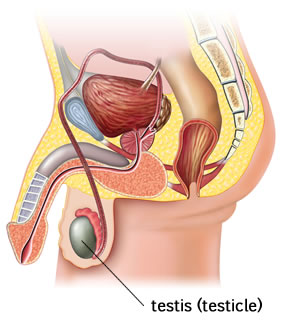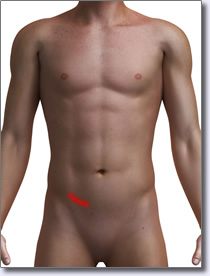Testicle Removal (Orchiectomy)
What is an orchiectomy?
For most patients, the recommended treatment for a tumor or mass in the testicle is to surgically remove that testicle to determine the type of tumor. This allows the pathologist to look at it under the microscope and determine how aggressive the cancer is and how likely it is to spread.
The testicle is removed using a 2- to 3-inch incision near the groin, similar to the incision used for a hernia repair. The skin on the scrotum will be left intact, but the testicle and the blood supply to that testicle will be removed.
What are the possible complications?
Any surgery can result in bleeding or infection; however, these are very rare with orchiectomy since it is a relatively routine surgery.
Because this testicle will be removed, there is no more sperm produced from that testicle. However, if the other testicle is normal, it should compensate and still produce enough sperm for fertility and male hormones such as testosterone. If the other testicle is not normal, fertility may be affected.

The function of the testes (testicles) is to produce male hormones and sperm. Note that the word "testis" (plural: "testes") is simply the formal anatomical term for "testicle." Doctors often use these terms interchangeably.
What happens if the testicle is not removed?
If the mass is cancerous, the longer it remains in place, the more it can grow and the more likely it will be to spread. Studies have shown that waiting to seek care and have the testicle removed can result in worse outcomes and lower survival rates.
What can I expect after my surgery?
Typically orchiectomy can be done as a same-day surgery or at most require an overnight stay in the hospital. You are allowed to resume your regular diet after surgery. There may be some associated pain from the incision; this will be managed with oral pain medicine. You will be able to walk immediately after surgery, but we recommend no strenuous exercise or lifting any object heavier than 20 pounds for two weeks.
You will be provided with our clinic phone number in case any problems arise. We will contact you once we know the pathologic results from the surgery (if those are not back by the time you are discharged from the hospital). We usually have a planned clinic visit two weeks after the surgery to discuss the results of your surgery and repeat blood tests. This will allow us to work on a plan for your care going forward.

This diagram shows the approximate size and location of an incision used in a typical orchiectomy.